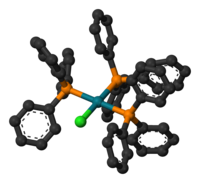
Photo from wikipedia
Abstract Synthesis, characterization and antibacterial activity of p-cymene ruthenium, Cp*rhodium and Cp*iridium metal complexes containing pyridyl azine Schiff base ligands have been described. All the complexes have been characterized by… Click to show full abstract
Abstract Synthesis, characterization and antibacterial activity of p-cymene ruthenium, Cp*rhodium and Cp*iridium metal complexes containing pyridyl azine Schiff base ligands have been described. All the complexes have been characterized by various spectroscopic techniques. Molecular structure of complexes 1, 2, 5, 6 and 8 have been obtained by single crystal X-ray diffraction analyses. Spectral studies revealed that ligand L1 bound to metals as neutral mono dentate N donor whereas ligand L2 and L3 revealed the formation of bi dentate NN′ cationic complexes. In vitro antibacterial activity of the complexes was evaluated by the agar well diffusion method using human pathogenic Gram positive bacteria Staphylococcus aureus and Gram-negative bacteria viz., Escherichia coli and Klebsiella pneumonia. Complexes 2–4 does not show any activity against the selected bacteria whereas complexes 1, 5–9 possesses moderate antimicrobial activity and they are more active than the free ligands. The potent activities of the complexes may arise from the coordination, which tends to make metal complexes act as more controlling and potent antimicrobial agents, thus hindering the growth of microorganisms.
Journal Title: Journal of Molecular Structure
Year Published: 2019
Link to full text (if available)
Share on Social Media: Sign Up to like & get
recommendations!